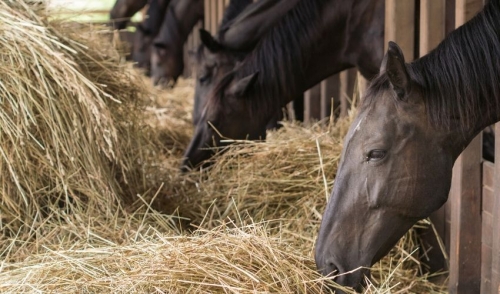{article.name}
Stay Informed
How to Feed a Horse With Ulcers

- Share this:
- Share on Facebook
- Pin on Pinterest
- Tweet on Twitter
Ulcers – sores in the gastric lining of the stomach or colonic ulcers in the hindgut – can make feeding a horse a proper diet more challenging. With conscientious effort and thoughtful care, however, you can ensure your horse has the appropriate nutrition without aggravating this often painful condition.
How Horses Get Ulcers
The exact causes of ulcers in horses can be difficult to diagnose, but it is a widespread problem among all ages, genders, breeds, and conditions of horses. Stress is believed to be a strong factor in the development of ulcers, and horses that generate excessive stomach acid can also have these painful sores. A high parasite load can exacerbate ulcers or make them easier to develop, and some bacterial infections are believed to play a part in ulcers. Determining whether or not your horse has ulcers can be challenging, but common symptoms include:
- Weight loss
- Loss of appetite
- Irritability and poor behavior
- Lethargy
- Flank sensitivity or resistance to the saddle
- Excessive chewing on wood or non-food items
- Pawing, laying down, or other signs of gastronomic distress
Because the symptoms of equine ulcers can be vague and could be associated with many different illnesses, it is important to consult a veterinarian for a proper diagnosis. This will also determine how many ulcers a horse may have and where they are located, information that can help direct the best course of treatment.
Feeding Horses With Ulcers
Even if a horse have ulcers, the animal still needs to eat to stay healthy – in fact, more eating can help improve ulcers because saliva has anti-acidic properties and can help neutralize acid in the front of the stomach where ulcers are most common. This doesn’t mean simply increasing the animal’s feed, however. Feeding a horse with ulcers must be done carefully to prevent aggravating the ulcers while still ensuring the animal receives the appropriate nutrition.
- Increase Turnout – The more a horse is allowed to graze, the more its salivary glands will be active and the more stomach acid will be neutralized. Ideally, horses should have several hours of daily turnout time and be allowed to freely forage through a healthy pasture.
- Spread Mealtimes Out – Instead of offering a horse one or two large mealtimes, spread several smaller meals out throughout the day. This will encourage more saliva production and keep the stomach from becoming overloaded, which can cause acid reflux and ulcers.
- Improve Forage Quality – Better forage in the horse’s pasture will help control and even heal ulcers. Plants with higher fiber, calcium, and protein content are preferred, whereas plants with more starch and carbohydrates should be minimized.
- Increase Fiber Supplements – Adding more fiber to your horse’s diet will help protect the stomach lining and minimize ulcers. Chopped alfalfa is an ideal option, but other alfalfa or similar high-fiber products can also be used.
- Offer Plentiful Water – Horses should always have access to plenty of fresh, clean water. Providing several watering stations will help horses drink more easily, and in winter, liquid water should be readily available and warmed for easy drinking to help dilute stomach acid.
With the proper diet, many equine ulcers will heal on their own. Maintaining an ulcer-care diet can ensure the problems do not resurface and keep the horse healthy, well-fed, and ulcer-free.
Ulcer Prevention Tips
In addition to a healthy diet, there are other steps that any horse owner can take to minimize the risk of even the most sensitive animal developing ulcers.
- Reduce Stress – Because stress is a key culprit for developing ulcers, reducing stress can help keep a horse’s stomach ulcer-free. Excessive travel, training, or shows could contribute to ulcers, or individual horses may have personality conflicts or strained relationships with other nearby animals. Improving those conditions can help minimize ulcers.
- Lower Exercise – If a horse is over-exercised, not only may the animal be under ulcer-producing stress, but the contractions of the stomach will splash acid higher into the digestive tract and could create more ulcers. Lessening the exercise schedule or opting for gentler activities can improve the horse’s condition.
- Reduce NSAIDs – Non-steroidal anti-inflammatory drugs (NSAIDs) decrease the production of protective mucus linings in a horse’s digestive tract, which can then make it easier for the animal to develop ulcers. Minimizing the use of these drugs and seeking alternative treatments can also reduce the risk of ulcers.
Ultimately, it is very common for horses to get ulcers, even with the best of care. By being aware of how ulcers are caused and taking steps to minimize the risk while offering a healthier diet, you can help ulcers heal and prevent painful recurrences.
Special Offers
We are constantly adding new specials to our site. Be sure to check back often!


Comments